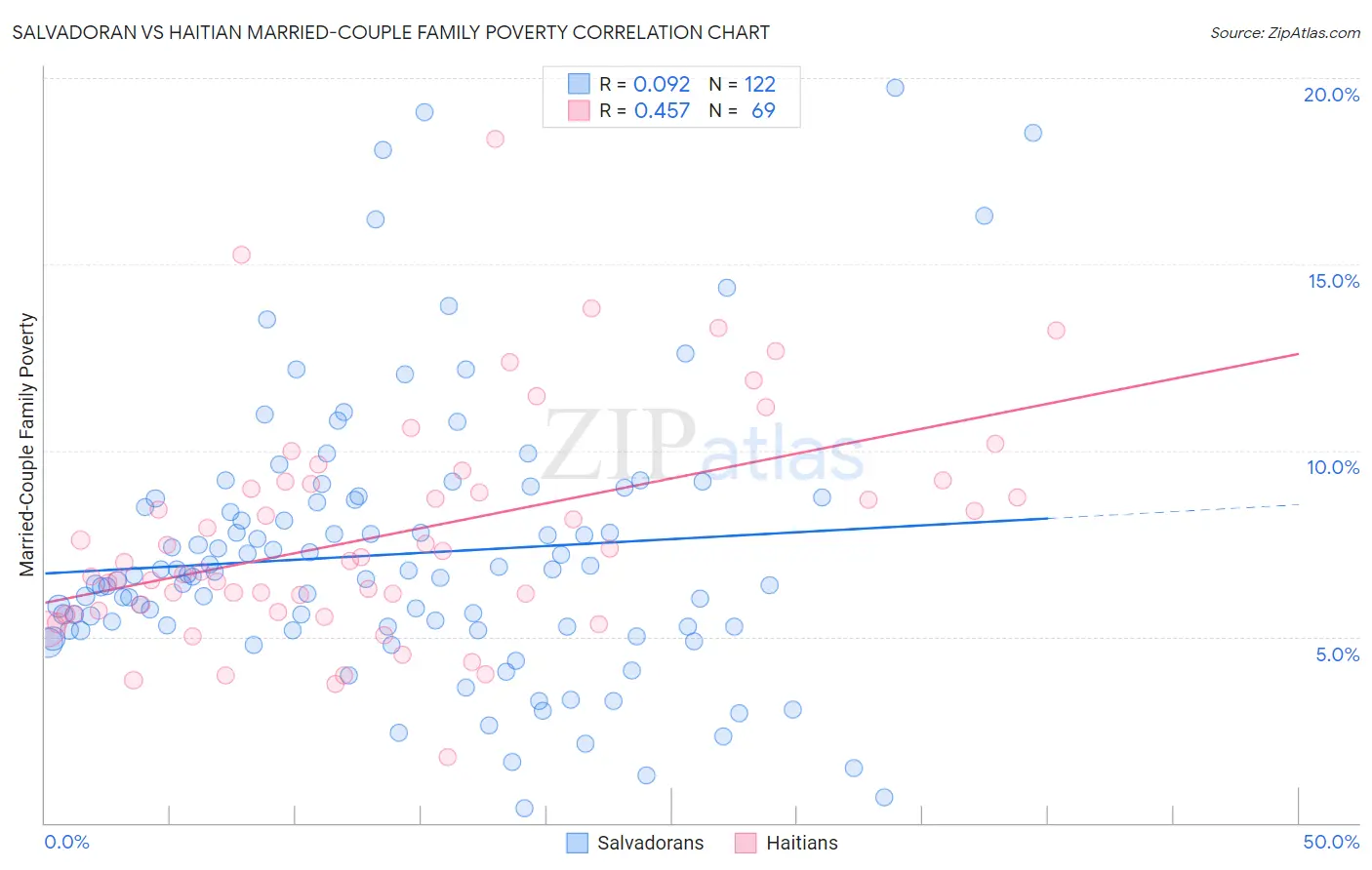Salvadoran vs Haitian Married-Couple Family Poverty
COMPARE
Salvadoran
Haitian
Married-Couple Family Poverty
Married-Couple Family Poverty Comparison
Salvadorans
Haitians
6.5%
MARRIED-COUPLE FAMILY POVERTY
0.0/ 100
METRIC RATING
288th/ 347
METRIC RANK
6.8%
MARRIED-COUPLE FAMILY POVERTY
0.0/ 100
METRIC RATING
305th/ 347
METRIC RANK
Salvadoran vs Haitian Married-Couple Family Poverty Correlation Chart
The statistical analysis conducted on geographies consisting of 395,885,602 people shows a slight positive correlation between the proportion of Salvadorans and poverty level among married-couple families in the United States with a correlation coefficient (R) of 0.092 and weighted average of 6.5%. Similarly, the statistical analysis conducted on geographies consisting of 285,930,838 people shows a moderate positive correlation between the proportion of Haitians and poverty level among married-couple families in the United States with a correlation coefficient (R) of 0.457 and weighted average of 6.8%, a difference of 4.3%.

Married-Couple Family Poverty Correlation Summary
| Measurement | Salvadoran | Haitian |
| Minimum | 0.40% | 1.8% |
| Maximum | 19.7% | 18.4% |
| Range | 19.3% | 16.6% |
| Mean | 7.2% | 7.7% |
| Median | 6.6% | 7.0% |
| Interquartile 25% (IQ1) | 5.3% | 5.7% |
| Interquartile 75% (IQ3) | 8.7% | 9.1% |
| Interquartile Range (IQR) | 3.4% | 3.4% |
| Standard Deviation (Sample) | 3.6% | 3.0% |
| Standard Deviation (Population) | 3.6% | 3.0% |
Demographics Similar to Salvadorans and Haitians by Married-Couple Family Poverty
In terms of married-couple family poverty, the demographic groups most similar to Salvadorans are Nepalese (6.5%, a difference of 0.17%), Ecuadorian (6.5%, a difference of 0.19%), Immigrants from Barbados (6.5%, a difference of 0.40%), Belizean (6.5%, a difference of 0.44%), and Guyanese (6.5%, a difference of 0.56%). Similarly, the demographic groups most similar to Haitians are Cuban (6.8%, a difference of 0.10%), Immigrants from El Salvador (6.8%, a difference of 0.55%), Immigrants from Ecuador (6.7%, a difference of 0.83%), Central American (6.7%, a difference of 0.97%), and Immigrants from Belize (6.7%, a difference of 1.6%).
| Demographics | Rating | Rank | Married-Couple Family Poverty |
| Guyanese | 0.0 /100 | #286 | Tragic 6.5% |
| Ecuadorians | 0.0 /100 | #287 | Tragic 6.5% |
| Salvadorans | 0.0 /100 | #288 | Tragic 6.5% |
| Nepalese | 0.0 /100 | #289 | Tragic 6.5% |
| Immigrants | Barbados | 0.0 /100 | #290 | Tragic 6.5% |
| Belizeans | 0.0 /100 | #291 | Tragic 6.5% |
| Immigrants | Lebanon | 0.0 /100 | #292 | Tragic 6.6% |
| Arapaho | 0.0 /100 | #293 | Tragic 6.6% |
| Bahamians | 0.0 /100 | #294 | Tragic 6.6% |
| Immigrants | Uzbekistan | 0.0 /100 | #295 | Tragic 6.6% |
| U.S. Virgin Islanders | 0.0 /100 | #296 | Tragic 6.6% |
| Kiowa | 0.0 /100 | #297 | Tragic 6.6% |
| Immigrants | Guyana | 0.0 /100 | #298 | Tragic 6.7% |
| Nicaraguans | 0.0 /100 | #299 | Tragic 6.7% |
| Immigrants | Belize | 0.0 /100 | #300 | Tragic 6.7% |
| Central Americans | 0.0 /100 | #301 | Tragic 6.7% |
| Immigrants | Ecuador | 0.0 /100 | #302 | Tragic 6.7% |
| Immigrants | El Salvador | 0.0 /100 | #303 | Tragic 6.8% |
| Cubans | 0.0 /100 | #304 | Tragic 6.8% |
| Haitians | 0.0 /100 | #305 | Tragic 6.8% |
| Immigrants | Haiti | 0.0 /100 | #306 | Tragic 7.0% |